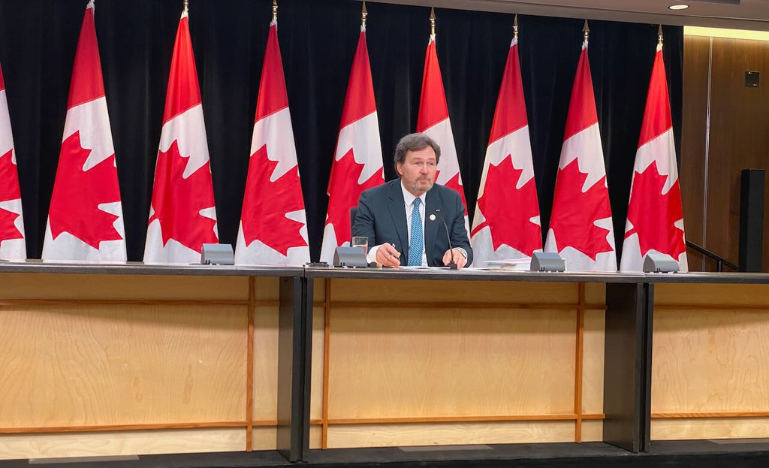La primauté du droit est non négociable au Canada
Le juge en chef Richard Wagner présente un message de confiance envers les tribunaux lors d’une conférence de presse annuelle

Le Canada est une « superpuissance démocratique » où la primauté du droit n’est pas négociable.
Tel était le message de Richard Wagner, juge en chef de la Cour suprême du Canada, lors de sa conférence de presse annuelle, dans un effort visant à répondre aux préoccupations soulevées par des gens lors de ses voyages dans le cadre des célébrations du 150e anniversaire du plus haut tribunal au pays.
Il dit que les gens s’inquiètent de voir des régimes de plus en plus autocratiques attaquer des institutions, des médias et des tribunaux, et craignent que cette régression des normes démocratiques se produise au Canada.
« C’est un message de confiance envers nos tribunaux, envers le fait qu’ils demeurent des gardiens inébranlables de la primauté du droit, qu’ils font preuve de résilience face aux nouveaux défis et qu’ils sont imperturbables dans leur engagement à défendre les droits et libertés des Canadiens », dit le juge en chef.
Bien que le Canada soit confronté à des défis, comme le sous-financement, les retards et les coûts, le système de justice est solide et compte dans ses rangs des avocats, avocates et juristes bien formés. Il affirme que les juges sont régis par des principes éthiques, « ce qui n’est pas le cas dans de nombreux pays qui nous entourent ».
Il croit que la confiance dans le système commence par un processus ouvert, transparent et non partisan de nominations à la magistrature. Le principe de l’indépendance de la magistrature garantit aux Canadiens que les juges rendent leurs décisions en se fondant sur les faits et le droit, et non sur d’autres considérations.
« L’indépendance de la magistrature n’est pas dans l’intérêt des juges, mais dans l’intérêt du public. »
Cela fait suite aux propos du premier ministre de l’Ontario, Doug Ford, qui a qualifié l’indépendance de la magistrature de « risée », tout en discutant ouvertement de l’élection des juges dans la province.
« Je n’entrerai pas dans un débat sur des déclarations de politiciens, car ce n’est pas mon rôle. Je laisserai d’autres élus s’occuper de ce travail, dit le juge en chef Wagner. Je crois comprendre que les juges en chef de l’Ontario ont publié une déclaration à la suite de certains commentaires sur la valeur de l’indépendance de la magistrature, et j’appuie entièrement leur déclaration. »
Dans le cadre des célébrations du 150e anniversaire de la Cour suprême du Canada, le retour de la cérémonie de rentrée judiciaire se tiendra en octobre, ce qui n’a pas eu lieu depuis les années 1980. L’événement marquera l’adoption des nouvelles robes de cérémonie des juges.
« Le discours du Trône du 27 mai était la dernière fois où mes collègues et moi allions porter ces robes avec la fourrure de vison blanche, dit Richard Wagner. Cette année, à l’occasion du 150e anniversaire, le moment est venu d’avoir de nouvelles robes qui reflètent mieux l’identité canadienne. Les nouvelles robes seront fabriquées au Canada. »
Il a également annoncé que la cour siégerait pour entendre des causes à Halifax en septembre 2027, comme elle l’a fait à Winnipeg en 2019 et à Québec en 2022.
« Les juges en chef Michael J. Wood et ses collègues de tous les paliers du système judiciaire de la Nouvelle-Écosse nous accueilleront », dit M. Wagner. De plus amples détails sont à venir.
En réponse aux questions posées, M. Wagner confirme que la Cour prévoit toujours de s’installer dans l’Édifice commémoratif de l’Ouest rénové en juin 2026. Cela permettra de procéder aux rénovations nécessaires.
Quant à la question de la traduction des décisions rendues avant 1970, il ne commentera pas le processus, qui est actuellement devant la Cour fédérale. Toutefois, le comité indépendant chargé d’examiner la question et de déterminer les décisions qui sont les plus pertinentes pour procéder à une traduction a déposé la semaine dernière son rapport auprès du greffier.
Interrogé sur les obligations éthiques des cabinets juridiques de résister aux tentatives d’intimidation par des dirigeants politiques – une référence à des événements aux États-Unis –, M. Wagner fait remarquer que les juristes au Canada sont des fonctionnaires judiciaires qui ont la responsabilité et l’obligation de soutenir l’indépendance de la magistrature et la primauté du droit, ainsi que l’indépendance du barreau.
Lorsqu’on lui a demandé les raisons pour lesquelles le Conseil canadien de la magistrature (CCM) n’était pas assujetti au régime fédéral d’accès à l’information, il a souligné les façons dont il avait accru la transparence du CCM, y compris des déclarations sur les délibérations des réunions et la rédaction de rapports directement à l’intention des juges de nomination fédérale. Les questions concernant le régime d’accès à l’information doivent être dirigées au Parlement.
M. Wagner souligne que le CCM vient de publier un sondage sur le bien-être des juges au Canada et qu’en deux jours, 30 % des juges y ont répondu.
En ce qui concerne la prolifération des projets de loi au Parlement qui visent à orienter la formation obligatoire des juges sur un éventail de sujets, maintenant que le précédent a été établi avec la loi sur les agressions sexuelles, M. Wagner est d’avis que l’Institut national de la magistrature (INM) veut avoir ces programmes d’éducation dans le contexte social. Cela est particulièrement important pour les juges des cours provinciales qui traitent la plupart des cas d’agression sexuelle au Canada.
« Il est important que tous les juges reçoivent une formation sur le contexte social et, chaque année, l’INM mettra sur pied de nouveaux programmes et trouvera de nouvelles façons de s’assurer que tous les juges du Canada, fédéraux et provinciaux, sont formés adéquatement pour faire face à la nouvelle réalité. »
M. Wagner affirme que l’Institut national de la magistrature a également décidé d’élargir sa formation à tous les juges provinciaux par le biais d’une entente avec l’Association canadienne des juges des cours provinciales, même si certaines provinces ne contribuent pas à l’INM.
« Un juge est un juge, qu’il s’agisse d’un juge provincial, d’un juge municipal, d’un juge de la Cour d’appel ou d’un juge de la Cour suprême, dit-il. J’aimerais que tous les juges au Canada aient la même formation et le même enseignement supérieur professionnel. »


